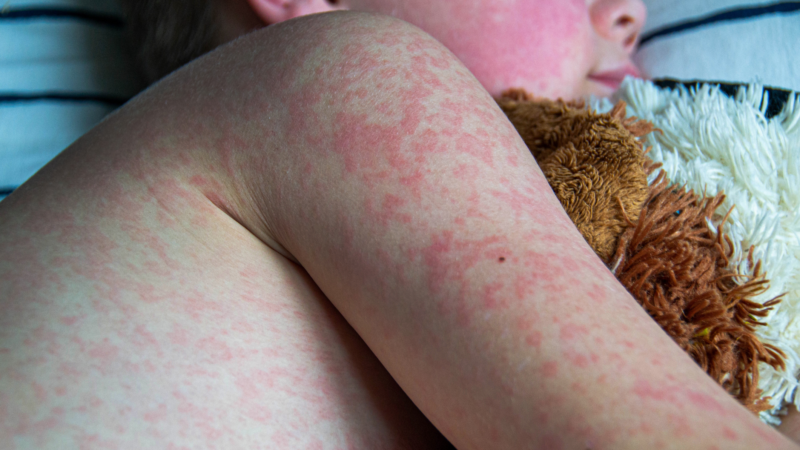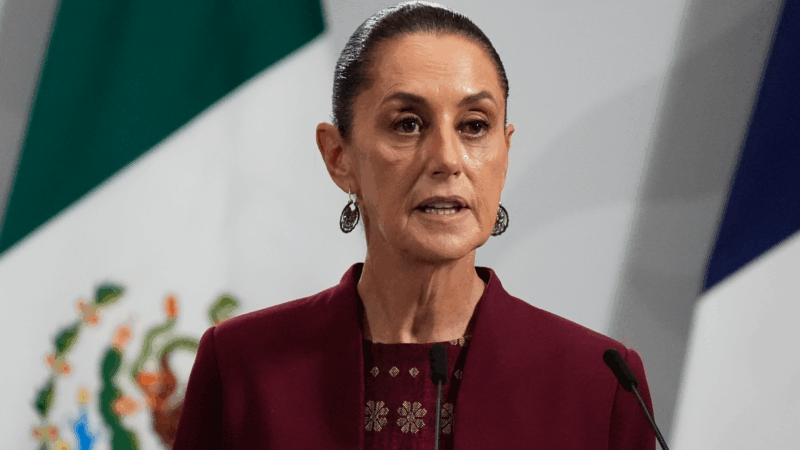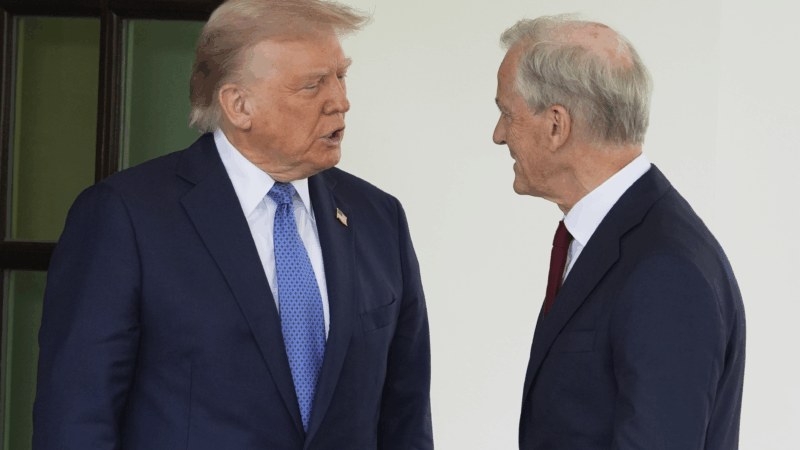As measles cases rise, a new book warns parents not to underestimate the disease
It’s a scourge that has afflicted mankind for more than a thousand years. And it’s what keeps Adam Ratner up at night: measles.
“It is the most infectious disease that we know by far — much more infectious than flu, much more infectious than COVID or polio or Ebola or anything else that I can think of,” says Ratner, a pediatric infectious disease physician in New York City.
In his new book, Booster Shots, Ratner makes the case that the control of measles is a test of how good our public health institutions are. And the fact that it is making a comeback is a bad sign.
“When vaccination levels start to fall, we see measles outbreaks first,” he says. “And then those are often followed by outbreaks of other vaccine preventable diseases, things that are a little less contagious than measles,” he say, adding, “It’s only February and we have already had, you know, small clusters of measles in Texas and Rhode Island and Georgia and a couple of other states.”
Globally, it’s estimated that measles killed more than 107,000 children in 2023, mostly unvaccinated or under vaccinated children under the age of five. Last year, the U.S. had 284 measles cases — the highest number in five years. That comes as kindergarten vaccination rates against measles, mumps and rubella have dropped below the 95% threshold that the Centers for Disease Control and Prevention says is needed to prevent community outbreaks.
The U.S. hasn’t reported a measles death since 2015. “But I think that with more cases, with larger outbreaks, that may change,” Ratner says.
Before the measles vaccine was developed in the early 1960s, the disease used to kill hundreds of children each year in the U.S. Ratner sees the resurgence of measles as one of the ironic byproducts of the success of vaccination. With vaccine hesitancy on the rise, he says that remembering the lessons of our past with this disease is more urgent than ever.

“Measles thrives on being underestimated,” he says. “We tend to forget now, looking back, how bad measles was.”
Ratner says the development of the measles vaccine was just one step in controlling the disease in the U.S. The other was public policy that made vaccination affordable and mandatory. For example, he points to a large measles outbreak in Texarkana in 1970. The metropolitan area straddles Arkansas – which had a school vaccine mandate in place – and Texas, which didn’t.
“About 95% of the cases were in the area where there wasn’t a vaccine mandate, where kids weren’t getting vaccinated in schools. So the political decision that was made about vaccine mandates affected the health of those children,” he says.
Ratner says he’s deeply concerned about the nomination of Robert F Kennedy Jr. as Health and Human services secretary. Kennedy has campaigned against vaccines for decades and he’s expected to be confirmed this week.
“I am very, very worried about the future of not only vaccines, but public health in general in this country and across the world,” he says.
Ratner makes the case that public policy is critical to public health. He says the most important takeaway from his book is that our public health successes are fragile.
“We live in a society now where child mortality is rare, where diseases like measles are rare, and where when kids are born, you can expect that they will likely grow up happy and healthy,” he says. “That is not guaranteed.”
He says it takes political will as well as science to keep the country healthy.
Edited by Jane Greenhalgh
Transcript:
MICHEL MARTIN, HOST:
As more parents in the U.S. push back against routine vaccinations for their kids, a new book makes the case that measles remains a threat that should not be underestimated. The disease kills thousands of children across the globe every year, and cases are rising in the U.S. NPR’s Maria Godoy has this report.
MARIA GODOY, BYLINE: It’s a scourge that has afflicted mankind for more than 1,000 years. And it’s what keeps Adam Ratner up at night – measles.
ADAM RATNER: It is the most infectious disease that we know, by far – much more infectious than flu, much more infectious than COVID or polio or Ebola or anything else that I can think of.
GODOY: Ratner is a pediatric infectious disease specialist in New York City. In his new book “Booster Shots,” he makes the case that the control of measles is a test of how good our public health institutions are. And the fact that it’s making a comeback is a bad sign.
RATNER: It’s only February, and we have had already this year, you know, small clusters of measles in Texas and Rhode Island and Georgia and a couple of other states.
GODOY: Globally, it’s estimated that measles killed more than 107,000 children in 2023. Last year, the U.S. had 284 measles cases – the highest number in five years. That comes as kindergarten vaccination rates against measles, mumps and rubella have dropped below the 95% threshold that the CDC says is needed to prevent community outbreaks. The U.S. hasn’t reported a measles death since 2015.
RATNER: But I think that with more cases, with larger outbreaks, that may change.
GODOY: Before the measles vaccine was developed in the early 1960s, the disease used to kill hundreds of children each year in the U.S. Ratner sees the resurgence of measles as one of the ironic byproducts of the success of vaccination.
RATNER: We tend to forget now, looking back, how bad measles was for populations.
GODOY: Ratner says the development of the measles vaccine was just one step in controlling the disease in the U.S. The other was public policy that made vaccination affordable and mandatory. He points to a large measles outbreak in Texarkana in 1970 – one metropolitan area straddling Arkansas, which had a school vaccine mandate, and Texas, which didn’t.
RATNER: About 95% of the cases were in the area where there wasn’t a vaccine mandate, where kids weren’t getting vaccinated in school. So the political decision that was made about vaccine mandates affected the health of those children.
GODOY: Ratner says he’s deeply concerned about the nomination of Robert F. Kennedy Jr. as Health and Human Services secretary. Kennedy has campaigned against vaccines for decades, and he’s expected to be confirmed this week.
RATNER: And I am very, very worried about the future of not only vaccines but public health in general in this country and across the world.
GODOY: Ratner makes the case that public policy is critical to public health. He says the most important takeaway from his book is that our public health successes are fragile.
RATNER: We live in a society now where child mortality is rare, where diseases like measles are rare and where, when kids are born, you can expect that they will likely grow up happy and healthy. That is not guaranteed.
GODOY: He says it takes political will, as well as science, to keep the country healthy.
Maria Godoy, NPR News.
(SOUNDBITE OF FLYING LOTUS SONG, “MORE (FEAT ANDERSON PAAK)”)
Indiana completes undefeated season and wins first national title, beating Miami
Indiana bullied its way into the history books Monday night, toppling Miami 27-21 to put the finishing touch on a rags-to-riches story, an undefeated season and the national title.
Top U.S. archbishops denounce American foreign policy
The three most-senior cardinals leading U.S. archdioceses issued the rebuke in a joint statement on Monday, saying recent policies have thrown America's "morale role in confronting evil" into question.
Italian fashion designer Valentino dies at 93
Garavani built one of the most recognizable luxury brands in the world. His clients included royalty, Hollywood stars, and first ladies.
Sheinbaum reassures Mexico after US military movements spark concern
Mexican President Claudia Sheinbaum quelled concerns on Monday about two recent movements of the U.S. military in the vicinity of Mexico that have the country on edge since the attack on Venezuela.
Trump says he’s pursuing Greenland after perceived Nobel Peace Prize snub
"Considering your Country decided not to give me the Nobel Peace Prize… I no longer feel an obligation to think purely of Peace," Trump wrote in a message to the Norwegian Prime Minister.
Can exercise and anti-inflammatories fend off aging? A study aims to find out
New research is underway to test whether a combination of high-intensity interval training and generic medicines can slow down aging and fend off age-related diseases. Here's how it might work.








